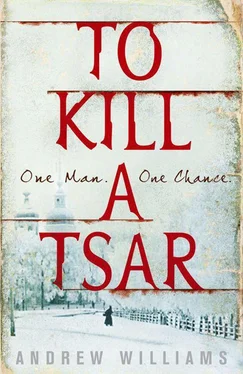The stirring last chords, a polite second’s silence then a crescendo of applause as the heavy curtains swept back to reveal the first of the principals. With moist eyes, Lady Dufferin turned to her party then back to the stage, her gloved hand gripping the edge of the balcony. Hadfield leant forward a little to peer over the countess’s, shoulder, and through the dark forest of hands he could see there were four empty seats. He felt a pang of disappointment: dowdy clothes, her neat little figure, her softly spoken accented Russian, her strange physicality, the frown that hovered between her dark brows — a little too closely set for classical beauty — her arrogant defiance and yet a certain reticence, and those searing blue eyes — those and more. He was intrigued and pleased, pleased he was now obliged to spend the following Sunday at Miss Kovalenko’s clinic.
28 MAY 1879
Major Vladimir Barclay did not see the executioner kick the steps away but he heard the gasp of thousands like the sighing wind on the winter steppe. The charged silence that followed was broken only by the priest’s prayers and the lazy creaking of the scaffold. Alexander Soloviev was twitching at the end of the rope. This was what they wanted, the young merchants and the old ladies wrapped in black, the frock-coated civil servants, these were the precious seconds they had waited an hour or more to witness. Kicking and shaking and slowly turning as life was choked from him before their eyes.
What a spectacle! Turning his back on the scaffold, Barclay began pushing through the crowd towards the line of carriages in front of the Semenovsky Barracks. It was not that he felt sympathy for Soloviev — it was only what he deserved — but the business was managed so badly. The hangman was a drunken criminal who emptied a bottle of vodka down his throat before he fumbled through his task.
Barclay’s driver had abandoned his post for a favourable view of the execution and was now lost in the crush of spectators. After a few minutes he came puffing up, red-faced, peaked cap in hand, which he swept before the major as he bowed contritely.
‘Fontanka 16 and smart about it,’ Barclay snapped.
But the entertainment was well and truly over, the crowd drifting away, and for all the driver’s easy cursing, the brandishing of his whip, the carriage crept on to Zagorodny at no more than a walking pace. A file of soldiers was marching along the prospekt to the lazy beat of a drum and the driver was obliged to join the carriages trundling in its wake.
Barclay had spent twenty years in uniform with the army and then the Gendarme Corps. Secret policeman, guardian of the state, he sometimes wondered if his name and background had directed his choice of role, as if he had felt it necessary to prove his loyalty to the empire. The Barclays had made their money in the timber trade; worse still, they were ‘foreigners’ of Scottish descent. Collegiate Councillor Dobrshinsky was the same. He was a member of the hereditary nobility from Kiev, but his family was Polish — they were ‘foreigners’ too. After observing his new superior for a week, Barclay was inclined to the view that this was almost the only thing they had in common. Dobrshinsky was single and unattached, a curious state of affairs for a thirty-five-year-old gentleman who, if not handsome, was quite prosperous enough to be eligible. Of course, there were many senior government servants who preferred the society of the demi-monde but no one Barclay had spoken to suspected the collegiate councillor of an exotic private life. He was bookish, an academic by disposition and a lawyer by training, distant, even a little cool with colleagues, and yet he enjoyed a formidable reputation as an interrogator, not of the bullying sort but as a student of the mind, a follower of Professor Wundt and the German school.
Barclay was flattered Dobrshinsky had singled him out to join the special investigation, although a good deal of his enthusiasm was dissipating as the size of the task they faced became apparent. Dobrshinsky had explained in his quiet measured way that it was their duty to protect His Imperial Majesty, and if that meant arresting every radical in the empire then that was precisely what they were going to do. With good intelligence that would not be necessary; well placed informers, more agents and better trained, a complete shake-up of the Third Section. Failure was unthinkable, the consequences immeasurable.
The special investigation team at Fontanka 16 had begun to creep across the first floor. A score of agents was assigned to the inquiry, clerks, copyists, an archivist and even a dedicated telegrapher with one of the new Baudot transmitters. The Third Section had seen nothing quite like it since the days of Tsar Nicholas. From dawn until long after dusk, clerks scurrying from room to room with telegrams and reports from gendarme stations across the empire, plain-clothes officers taking witness statements or questioning known radicals, street superintendents flicking through photographs in an effort to identify ‘illegals’ in their districts, and at the heart of this frantic activity, the special investigator himself. Dobrshinsky was at a blackboard with an agent when Barclay stepped inside the main inquiry room. There was an unnatural hush; the officers bent low over their desks like schoolboys before their teacher. Cheap furniture had been crammed into the office to meet the needs of the investigation and the agents sat in a phalanx of desks pressed together in the middle of the room. Along one of the walls, three large sash windows with a view over the Fontanka; against the rest, wooden filing cabinets, bookcases, blackboards and tables.
‘Vladimir Alexandrovich, how timely,’ said Dobrshinsky with an expression Barclay took for a smile. ‘We have something of great interest at last, please…’ and he indicated with a look and a brisk sweep of the hand that the gendarme officer should follow him into his office. ‘And you too, Kletochnikov,’ he said, addressing the agent at his side.
‘A good show?’ Dobrshinsky asked as he settled behind his perfectly ordered and polished mahogany desk.
‘A large crowd, Your Honour.’
‘No need for formality,’ said Dobrshinsky, offering them both the leather library chairs opposite. ‘It was a pointless waste. In time, I might have won Soloviev’s confidence. Justice has not served us well in this case, a little too blind and impatient, I fear. But we have something…’
He reached into his drawer and pulled out a red leather-bound file, opened it and spread his hands on the desk in front of him in a gesture of satisfaction.
‘Yes, thank goodness we have something. Two valuable pieces of intelligence, the first, a report taken from a yard keeper on the Fontanka Embankment a short distance from here. The second, well, that is why Agent Nikolai Vasilievich is here.’
Kletochnikov coloured a little with embarrassment and glanced down at his hands twisting in his lap. Well, well, a secret policeman who blushes; Barclay suppressed the temptation to smile. The poor fellow seemed very young, no more than thirty, slight, round-shouldered, with a thin intelligent face and spectacles.
‘The dvornik was questioned by a local constable and he gave a remarkably good description of what was almost certainly an illegal gathering at a mansion opposite. It’s owned by a…’ Dobrshinsky glanced down at the file, ‘a Madame Volkonsky, a sentimental old aristocrat, a champagne revolutionary.’
It was a Sunday afternoon, which was why the yard keeper was sober, he explained. The old man puffed on his pipe and watched the comings and goings at Number 86 with keen interest and with a surprising eye for detail.
Читать дальше












